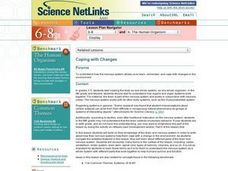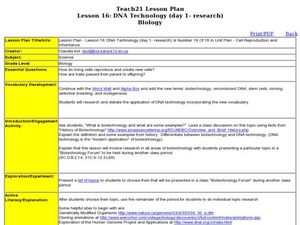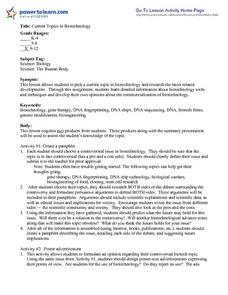Curated OER
Cloning Around
Review concepts of cloning and genetic engineering and participate in a round-table discussion based on the ethics and potential of cloning with your class. Each learner then writes a formal essay on the topic, stemming from the debate.
Forest Foundation
The Nature of Trees
Young botanists examine the different parts of tress and then draw parallels between the functions of these parts and the function of parts of the human body.
National Endowment for the Humanities
Albert Sabin and Bioethics: Testing at the Chillicothe Federal Reformatory
Do the ends justify the means? Getting a drug approved in the US is a long and involved process. But at some point out, it involves testing on humans. The ethics of such testing is the focus of a resource that uses Dr. Albert Sabin's...
Curated OER
Fighting Back!
Fifth graders inspect the basic functions of the immune system and determine how viruses and bacteria invade the immune system. They also explore what happens to the immune system in outer space.
Agriculture in the Classroom
Understanding the Columbian Exchange Through Old World and New World Foods
If you're interested in teaching your class about the impact of the Columbian Exchange on contemporary society, this is worth a look. The plan begins with an introduction to the topic, which stems from a cell phone poll...
Curated OER
Making a Human Tree
Learners explore botany by defining the anatomy of a tree. In this environmental exploration activity, students research plant vocabulary terms and discuss the uses of each word. Learners create a "human" tree by role-playing as one of...
Curated OER
Introduction to the Circulatory System
Fifth graders study the circulatory system. In this circulatory system, 5th graders participate in five stations with different activities at each station. Students discuss their findings from each station.
Teach Engineering
How Antibiotics Work
Take two pills and call me in the morning. The first lesson in a short unit of four introduces class members to delivery methods of medicines. The instruction introduces the question of which delivery method is best to get you feeling...
Teach Engineering
Microfluidic Devices and Flow Rate
When you have to flow, you have to flow. The lesson introduces class members to microfluidic devices and their uses in medicine. They watch a short video on how the diameter affects the rate of flow. The worksheet has individuals...
Curated OER
TE Lesson: What's Dominant?
Students study the number of chromosomes in the body cells, sperm cells, and egg cells of humans. They define allele, and examine the difference between dominant and recessive alleles. They complete an activity with jelly beans that...
Curated OER
Unlocking the Endocrine System
Fifth graders use an analogy to the mail delivery system to study the workings of the human endocrine system. They discover the interrelationships between the human body systems while comparing them to engineering communicating with...
Curated OER
Digestive System
Students analyze how the digestive system works by taking the food we eat and breaking it down for our bodies to use for various reasons. They list the major components of the digestive system and draw a diagram. They explain how...
Curated OER
Coping with Changes
Young scholars build on knowledge of brain and nervous system in order to write about how their nervous systems help them cope with change in environment. Students navigate online sites to explore different parts of brain and nervous...
National Nanotechnology Infrastructure Network
Help or Hype: The Ethics of Bio-Nanotechnology
Ethical concerns are not always black and white. A well-designed lesson presents learners with scenarios for which ethics may come into question. Scholars learn to consider the different sides of a situation and make an unbiased conclusion.
Curated OER
Lesson 16: DNA Technology
Students research different areas of biotechnology. In this biology lesson, students create a presentation about their research. They debate the topic presented and share their views on the subject.
Curated OER
Chromosomes
Students explore genetics, chromosomes and DNA. In this genetics lesson students design a chromosome and identify a family tree through genetics.
Curated OER
Current Topics in Biotechnology
Eleventh graders are introduced to the concept of biotechnology. Using the internet, they research the latest developments in this field and the tools used by biotechnologists. They share their information with the class and create a...
Curated OER
Bioethics And Fetal Tissue Research
Pupils are introduced to the topic of fetal tissue implantation. In groups, they examine a case study and share information with the rest of the class. Then they do a reflective writing assignment to assess understanding of the ethical...
Curated OER
Endocrine Excitement!
Students are divided into a group of hormones and a group of receptors. The hormones have to find their matching receptors, and the pair, once matched, perform a given action. This activity helps students examine the specificity of...





















